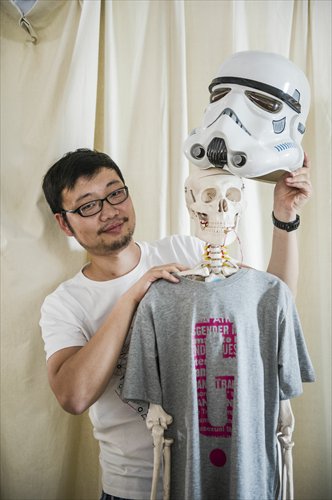

Wang Dong, a senior editor at online science channel Guokr. Photo: Li Hao/GT
Hastily pacing his way across campus in a navy blue T-shirt and matching shorts, 36-year-old Wei Kunlin could be mistaken for a postgraduate student running late for class after a stint in the gymnasium.
In actuality, he is an associate professor in the Department of Psychology at Peking University. He is also a minor celebrity, having appeared as a judge on the televised talent show Super Brain, which screened on Jiangsu Satellite TV from January to March of this year.
The show purports to find people who possess abilities that might be considered "out-of-the-ordinary." One contestant was able to tell how much water there was in a glass, simply by listening to the sound emitted when rubbing one's finger along the glass's rim; another contestant solved two Rubik's Cubes, while blindfolded and submerged underwater, before he had to come up for air.
Wei's role on the show was to judge, as well as to explain to the audience, how difficult the tasks attempted by the contestants actually were, based on scientific theory. He has attracted a small army of fans, with more than 370,000 followers on Sina Weibo (China's equivalent to Twitter).
"In China, the level of scientific literacy among the general populace is very low," said Wei, explaining why he chose to do the show.
"That's why news stories about genetically modified foods and other topics that involve specialist scientific knowledge create such a fuss among the public. It's also the reason why so many people fall prey to scams and false claims made by pseudoscience in this country," said Wei.
Celebrity scientists
The problem, it seems, is not that there is a dearth of scientists in China, but that there is a dearth of scientists that are willing or able to educate the general public about scientific issues that concern them.
According to a report published in 2010 by the United Nations Educational, Scientific and Cultural Organization, China had more people who hold doctorates in Science and Engineering in the decade from 2001-2010 than any other country in the world, bar the United States, reported the Beijing Evening News.
But there remains a disconnect between the flourishing of science in China as a field of specialist study, and of science as a form of general knowledge among the masses.
Wang Dong, a former science tutor at a university in Shandong, speculates that this may be due to the differing funding incentives of the two countries.
"Unlike scientists in the US who often have to raise research money from private foundations and enterprises, most of the funding for scientific research in China comes from the government," said Wang.
Wei agreed with the fact that scientists in China did not do enough to promote a wider understanding of their work among the populace.
"The top scientists in China focus more on their own laboratory research. They're too busy to make their voices heard by the public," he said.
While there are a number of celebrity scientists with their own television shows (such as Adam Savage and Jamie Hyneman with Mythbusters, or William Sanford Nye with Bill Nye the Science Guy) in the West, far fewer programs of this kind exist in China. Such shows aim to popularize science among the masses, by making it fun, accessible, and understandable to a general audience.
Copyright ©1999-2018
Chinanews.com. All rights reserved.
Reproduction in whole or in part without permission is prohibited.